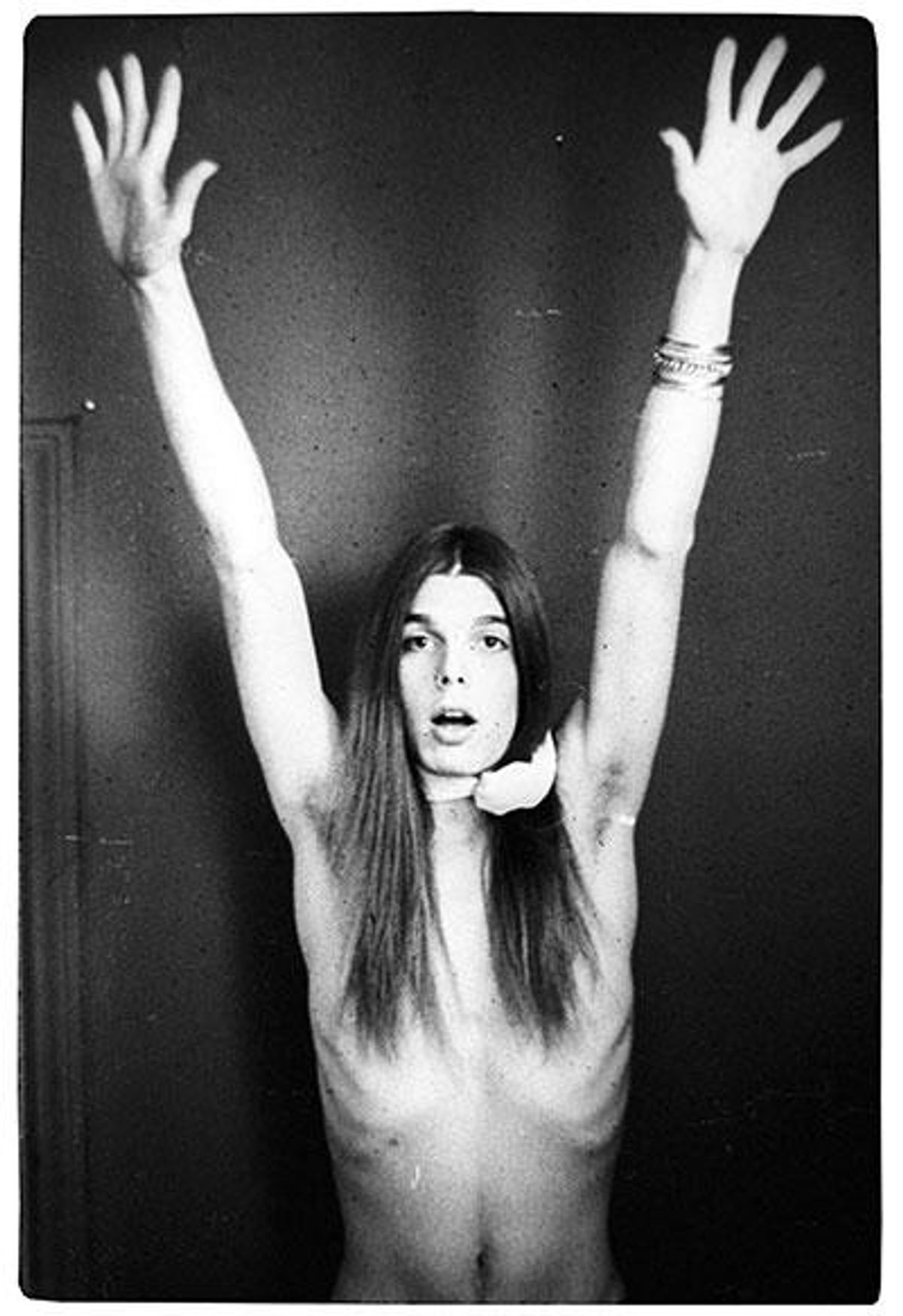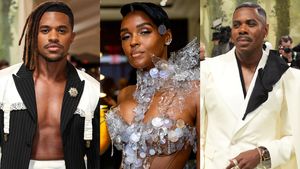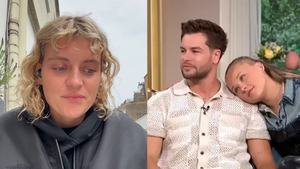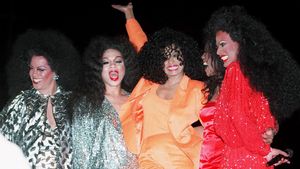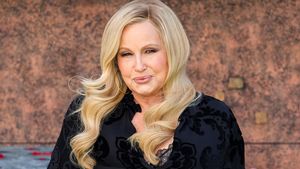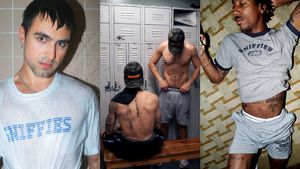The music of 1970s gay rockers Smokey can finally be enjoyed by a mass audience, now that a collection of the band's singles has been re-released.
How Far Will You Go? The S&M Recordings, 1973-81 is the first re-issue of Smokey's music, and that's thanks to the folks at the Australian label Chapter Music.
The band itself was the brainchild of songwriter John "Smokey" Condon, a Baltimore musician known for his androgynous beauty. After being kicked out of his family home, Condon partied with the John Waters crowd for a spell before leaving for New York City in the late 1960s. After a brief Big Apple stint, he made his way to Los Angeles, where he met budding record producer EJ Emmons, fresh off a tour as a soundman for The Doors. The two were a couple for eight years, with Emmons acting as Smokey's producer. He also repeatedly met with music label executives -- trying to get his talented boyfriend a record deal.
Smokey was a sensation on L.A.'s local club scene, playing raucous shows nearly every week at Rodney Bingenheimer's legendary English Disco on the Sunset Strip. The band boasted a stellar roster of rotating musicians that included future rock guitar superstars Randy Rhoads (Quiet Riot, Ozzy Osbourne), Adrian Belew (King Crimson), and James Williamson (Iggy and the Stooges).
But Condon's queerness prevented him from achieving the kind of fame he deserved. Record labels balked. "Somebody asked EJ if I was a f****t," says Condon, now 62 and living in Palm Springs. Both he and Emmons, also 62, remember the label heads saying they wouldn't release "a fucking gay record."
At that time, glam rocker David Bowie was teasing the press with news of his bisexual dalliances. Yet, Bowie was married to his wife Angie, and the couple had a young son. Most music writers, if they believed Bowie at all, chalked the talk up to his many eccentricities.
Condon was another story. Although those record execs loved Smokey's swaggering, bluesy brand of rock, they took issue with his outre lifestyle -- and his lyrics. His gritty songs about gay life came packaged with titles like "Leather" and "Hot, Hard & Ready." "Million Dollar Babies" was an ode to the male hustlers who serviced truck drivers in Greenwich Village. A later single was called "Piss Slave."
"I sang about things I knew," Condon explains. "I was in New York in the late '60s. Stonewall was happening, leather bars. I had grown up in Baltimore, and lived with a drag queen. These were just my life experiences."
Emmons says industry folks couldn't handle it. "They were old-school guys," he explains. They acknowledged Condon had the makings of a star, but they refused to sign him. "They weren't un-nice about it," Emmons says. "They just plain weren't going to sign us because we were like that. Lew Bedell fromDore.And Denny Rosencrantz at Mercury, same thing.
"Brett Salem, who was a country guy, from MGM. I worked at MGM, so I took the record into his office," Emmons says, and then affects a Southern accent to imitate Salem. "'Well, this is a really good record, but we can't put this out!"
Was Condon ever tempted to hide his sexuality to advance his career? "Absolutely not," he says, although he admits to knowing plenty of musicians who did. "EJ and I have been around," he says. "We've met -- or slept -- with several of them."
Condon says he never judged musicians for closeting themselves for their careers. "It's not a healthy way to live," he says. "But if they felt that they had to get their art out, or if that was their art, they had to do it, good for them. We just took a different route."
The duo opted to release five of Smokey's singles on their own label, the cheekily titled S&M Records. (The label's logo featured a bulging bicep with an "S&M" tattoo.) Some singles sold several thousand copies and the buzz around the band continued to grow, so much so that a fan club was formed. Its founder? A teenage Joan Jett. Condon remembers Jett as a "sweet girl."
"She used to go to Rodney's when we'd play there," Condon says. "There was a group of about five girls that would go every time we played. Then she came over our house, and she wanted to be in the band, and we said, 'Joan, you're just too young.' She was 16 or so. I loved her to death."
No one was prouder than Condon when Jett's own career took off, first in the mid-1970s with the all-girl band The Runaways, and later as a solo artist.
"I was really excited for her," Condon says. "I went to Peaches Records and had her autograph the Runaways album."
Condon says guitarist Rhoads, who went on to play with some of the biggest names in heavy metal, was just a young kid when he gigged with Smokey. "Randy was a great musician," he says. "I can't say enough good things about him. I'm glad he went on to Quiet Riot, and I'm glad he went on to Ozzy's band."

Though Smokey's music was decidedly gay, Emmons says he and Condon were the only "fags" in the Smokey camp. Were straight musicians like Rhoads ever bothered by playing in a gay guy's band? "Hell no," says Condon. "They just wanted to make music. They weren't interested in money, fame and fortune, and they didn't have agents -- they just wanted to be musicians."
Photos of Condon in Smokey's heyday show an impossibly beautiful young man. In earlier shots, his hair is long, as was the hippie fashion of the day. In photos taken later in the 1970s, his hair is short and he wears leather jackets, posing with motorcycles and vintage cars. In all of the shots, he's gorgeous. Still, Condon say he's not sure he was a heartthrob. "I'm very shy and very insecure, so I never thought of myself as good-looking or pretty," he says.
"But he was!" Emmons adds, laughing.
Condon says being a young gay man in the counter-culture 1960s and early 1970s was a dream: "It was free love, it was drugs. And the pressures on gay people weren't the same. I mean, you could be pretty, you didn't have to be a muscular boy. You could be zany and have a lot of fun."
Some of that fun took a toll. Smokey's live shows dwindled after 1977, partly from Condon's exhaustion from his rock 'n' roll lifestyle. (One Smokey legend has the singer, strung-out on Quaaludes, throwing up on music mogul David Geffen.) The band finally called it quits in the early 1980s, but not before releasing a special "fuck you" song to the music industry, the aforementioned "Piss Slave," an eight-minute disco track. Its lyrics, including the line "I wanna be your toilet," famously cleared the dance floor of one L.A. club.
Condon quit making music and became "an average Joe," finding work with a lighting company -- his employer to this day. But giving up his dream wasn't easy. "It took me 10 years to get over it," he says. "I had to come to grips with it."
As the years went on, he eventually saw gay pop stars coming out and having success. It was difficult for him.
It's been even stranger in recent years, he says, watching straight artists writing hit songs about gay life. Condon feels some of them capitalize on the trendiness of being an LGBT advocate.
"I was dating a guy recently who was telling me how great Macklemore and Ryan [Lewis] are because one has a gay uncle and he wrote a song about it?" says Condon skeptically. "And so I watched them on some show, maybe it was the Grammys, I don't know, some show. And Madonna was on there. It's all hype. It's all for money."
Condon says his music was never about being gay. It was about life. It just so happened it was the life of a gay man. The music had no agenda.
"What we did was from the heart always," he says earnestly. "Always. It wasn't 'I'm gay, I'm throwing it in your face,' it was just, ;we had music, and we're going to play this music.'"
It may have taken 40 years, but today's music writers are falling over themselves to get the word out about How Far Will You Go?
"It just blows me away that it's getting the reception that it's getting," says Condon, who jokes that he always knew he was ahead of his time -- just not how far ahead.
Now that the world is ready for Smokey, the duo are considering recording some new music. There's even pressure for upcoming live shows. Is Condon willing?
Sure, he says, laughing. "My body's still good!"
